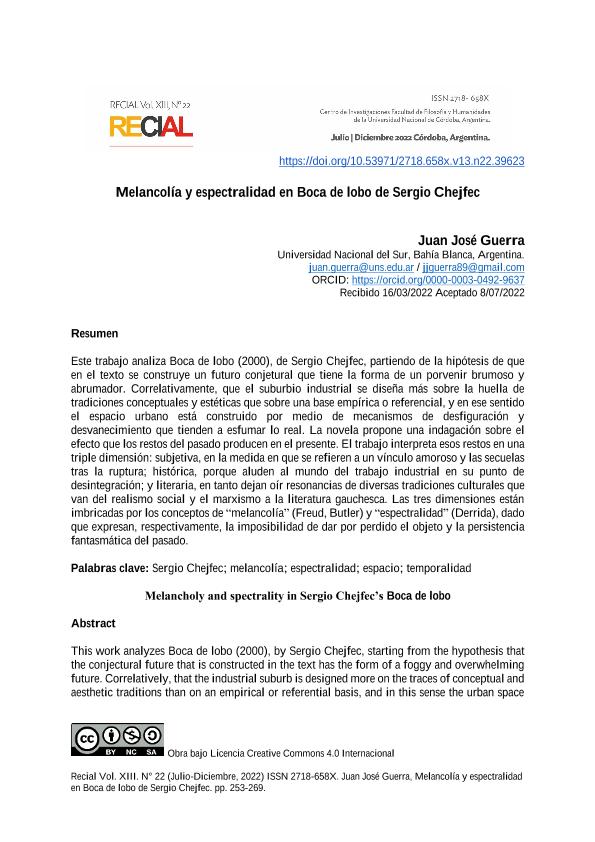Mostrar el registro sencillo del ítem
dc.contributor.author
Guerra, Juan José

dc.date.available
2023-10-24T14:55:58Z
dc.date.issued
2022-12
dc.identifier.citation
Guerra, Juan José; Melancolía y espectralidad en Boca de lobo de Sergio Chejfec; Universidad Nacional de Córdoba. Facultad de Filosofía y Humanidades. Centro de Investigaciones "María Saleme de Burnichon"; Recial; 13; 22; 12-2022; 253-269
dc.identifier.issn
1853-4112
dc.identifier.uri
http://hdl.handle.net/11336/215753
dc.description.abstract
Este trabajo analiza Boca de lobo (2000), de Sergio Chejfec, partiendo de la hipótesis de que en el texto se construye un futuro conjetural que tiene la forma de un porvenir brumoso y abrumador. Correlativamente, que el suburbio industrial se diseña más sobre la huella de tradiciones conceptuales y estéticas que sobre una base empírica o referencial, y en ese sentido el espacio urbano está construido por medio de mecanismos de desfiguración y desvanecimiento que tienden a esfumar lo real. La novela propone una indagación sobre el efecto que los restos del pasado producen en el presente. El trabajo interpreta esos restos en una triple dimensión: subjetiva, en la medida en que se refieren a un vínculo amoroso y las secuelas tras la ruptura; histórica, porque aluden al mundo del trabajo industrial en su punto de desintegración; y literaria, en tanto dejan oír resonancias de diversas tradiciones culturales que van del realismo social y el marxismo a la literatura gauchesca. Las tres dimensiones están imbricadas por los conceptos de ´melancolía´ (Freud, Butler) y ´espectralidad´ (Derrida), dado que expresan, respectivamente, la imposibilidad de dar por perdido el objeto y la persistencia fantasmática del pasado.
dc.description.abstract
This work analyzes Boca de lobo (2000), by Sergio Chejfec, starting from the hypothesis that the conjectural future that is constructed in the text has the form of a foggy and overwhelming future. Correlatively, that the industrial suburb is designed more on the traces of conceptual and aesthetic traditions than on an empirical or referential basis, and in this sense the urban space is built through mechanisms of disfigurement and fading that tend to blur the real. The novel is built on the basis of an inquiry into the effect that the remains of the past produce in the present. We interpret these remains in a triple dimension: subjective, to the extent that they refer to a love bond and the aftermath after the breakup; historical, because they allude to the world of industrial work at its point of disintegration; and literary, insofar as they allow to hear resonances of diverse cultural traditions that range from social realism and Marxism to gaucho literature. The three dimensions are imbricated by the concepts of “melancholy” (Freud, Butler) and “spectrality” (Derrida), since they express, respectively, the impossibility of giving up the object and the phantasmatic persistence of the past.
dc.format
application/pdf
dc.language.iso
spa
dc.publisher
Universidad Nacional de Córdoba. Facultad de Filosofía y Humanidades. Centro de Investigaciones "María Saleme de Burnichon"
dc.rights
info:eu-repo/semantics/openAccess
dc.rights.uri
https://creativecommons.org/licenses/by-nc-sa/2.5/ar/
dc.subject
SERGIO CHEJFEC
dc.subject
MELANCOLÍA
dc.subject
ESPECTRALIDAD
dc.subject
ESPACIO
dc.subject.classification
Literaturas Específicas

dc.subject.classification
Lengua y Literatura

dc.subject.classification
HUMANIDADES

dc.title
Melancolía y espectralidad en Boca de lobo de Sergio Chejfec
dc.title
Melancholy and spectrality in Sergio Chejfec’s Boca de lobo
dc.type
info:eu-repo/semantics/article
dc.type
info:ar-repo/semantics/artículo
dc.type
info:eu-repo/semantics/publishedVersion
dc.date.updated
2023-10-23T17:00:19Z
dc.identifier.eissn
2718-658X
dc.journal.volume
13
dc.journal.number
22
dc.journal.pagination
253-269
dc.journal.pais
Argentina

dc.journal.ciudad
Córdoba
dc.description.fil
Fil: Guerra, Juan José. Universidad Nacional del Sur. Departamento de Humanidades; Argentina. Consejo Nacional de Investigaciones Científicas y Técnicas. Centro Científico Tecnológico Conicet - Bahía Blanca; Argentina
dc.journal.title
Recial
dc.relation.alternativeid
info:eu-repo/semantics/altIdentifier/url/https://revistas.unc.edu.ar/index.php/recial/article/view/39623
dc.relation.alternativeid
info:eu-repo/semantics/altIdentifier/doi/http://dx.doi.org/10.53971/2718.658x.v13.n22.39623
Archivos asociados
